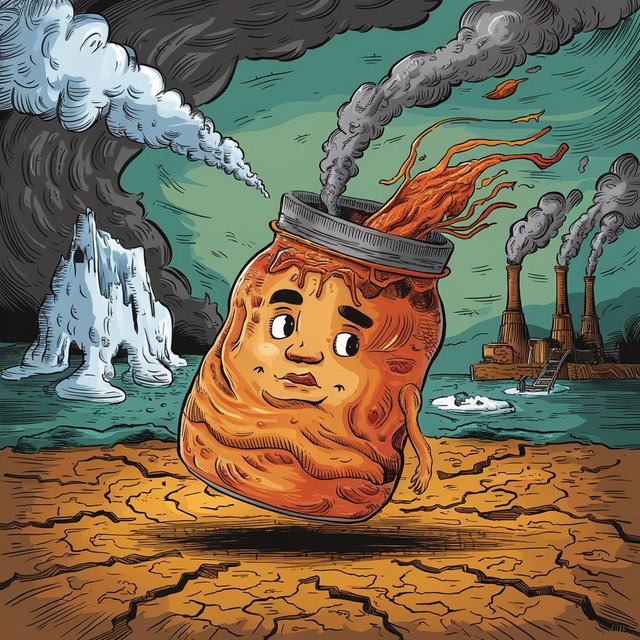Kimchi in Danger: How Climate Change is Impacting South Korea's Beloved Dish
Climate change isn't just about melting ice caps and rising sea levels—it's also affecting the food we eat. In South Korea, a cherished national dish, kimchi, is facing some serious challenges. This spicy, fermented food, mainly made from Napa cabbage, is struggling as climate change reshapes the environment. Let’s dive into how global warming is threatening kimchi—and other traditional dishes around the world.
Kimchi's History and Current Challenges
Kimchi has been a staple of Korean cuisine for over 3,000 years. Originally, it was a way to preserve vegetables through the harsh winter months. Today, it’s a vital part of Korean meals and culture. But with climate change causing rising temperatures and unpredictable weather, the future of kimchi is in jeopardy.

Napa cabbage, the key ingredient in kimchi, thrives in cooler climates. Traditionally grown in higher elevations, this vegetable is now facing severe problems. Increasing temperatures, erratic rainfall, and new soil diseases are damaging the crops. As a result, the amount of land available for growing Napa cabbage has shrunk by more than half in recent decades. If these trends continue, South Korea could struggle to grow Napa cabbage by 2090.
Global Impact: From Poutine to Sushi
South Korea isn’t the only place dealing with these challenges. Climate change is disrupting traditional foods all over the world:
Canada's Poutine: This popular dish of fries, cheese curds, and gravy is threatened by shrinking potato supplies and heat-stressed dairy cows. As temperatures rise, both the quantity and quality of these ingredients are decreasing.
China's Peking Duck: Known for its crispy skin and tender meat, Peking duck relies on healthy ducks. However, increasing heat stress is causing more diseases and deaths among ducks, affecting the dish's quality.
Costa Rica's Gallo Pinto: This traditional rice and beans dish is struggling as climate change alters the growing conditions for its main ingredients.
Japan's Sushi: Rising sea temperatures are harming fish and shifting fish populations, which could impact the availability and quality of sushi.
India's Aloo Paratha: This popular bread stuffed with spiced potatoes is facing issues due to changes in crop yields and growing conditions.
Efforts to Save These Dishes
Scientists and farmers around the world are working hard to tackle these issues. In South Korea, efforts are underway to develop new varieties of cabbage that can withstand higher temperatures. Researchers are also exploring better irrigation methods and organic techniques to fight crop diseases.
Similarly, other countries are finding ways to protect their culinary traditions. For instance, Canada is experimenting with new potato varieties and improved farming practices to cope with heat stress.

What Can We Do?
While global leaders and scientists play a crucial role in addressing climate change, there are steps we can all take to help:
Support Sustainable Practices: Choose locally grown and sustainable foods whenever possible. This reduces your carbon footprint and supports farmers who are adapting to climate change.
Educate and Advocate: Stay informed about climate change and its impact on food. Support policies that promote environmental sustainability and food security.
Reduce Waste: Be mindful of food waste. By using resources more efficiently, we can help lessen the strain on agricultural systems.
Conclusion
Climate change isn’t just a distant threat—it’s a real challenge affecting our daily lives and favorite foods. From kimchi in South Korea to sushi in Japan, traditional dishes are at risk as the world warms. By understanding these issues and taking action, we can help preserve the flavors and traditions that make our global cuisine so rich and diverse.
Stay informed, stay engaged, and remember that every small action counts in the fight against climate change.
Thank you, friend!


I'm @steem.history, who is steem witness.
Thank you for witnessvoting for me.
please click it!
(Go to https://steemit.com/~witnesses and type fbslo at the bottom of the page)
The weight is reduced because of the lack of Voting Power. If you vote for me as a witness, you can get my little vote.
"Wow, what a fascinating and thought-provoking post! 🌎💚 I had no idea that climate change was affecting traditional dishes like kimchi in South Korea and sushi in Japan. It's amazing to see how interconnected our food systems are with the environment. The illustrations really brought this issue to life, too! 😊 I love how you highlighted the efforts of scientists and farmers working together to develop new solutions. What can we do? 🤔 We can support sustainable practices by choosing locally grown and sustainable foods (🥕) whenever possible, educate ourselves and others about climate change, and reduce waste by being mindful of our food use. Let's work together to preserve the flavors and traditions that make our global cuisine so rich and diverse! 💖 By voting for @xpilar.witness at https://steemitwallet.com/~witnesses, we can help continue to grow and succeed as a community 🌟"